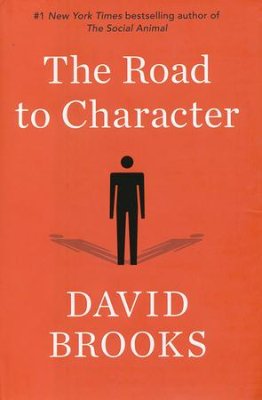The Road To Character, by David Brooks

The Road To Character by David Brooks
Reading David Brooks is like becoming acquainted with a long lost brother whose heart beats with the same hunger for the restoration of men and women. Though his inquiry is powerfully intellectual, historical, and even philosophical (which makes sense—he is a prolific writer for the New York Times), the sincerity of his quest for personal restoration shines through as well; he is a man who has descended through his own initiation. Through his personal reckoning, he’s become a trustworthy guide and steady clarifying voice. His personal reflections on love and his distilled insight into the texture of humility are without a doubt some of the most helpful guidance I’ve ever absorbed. Devoted to truth-telling, he offers biographical sketches of ten historical figures without minimizing either the strengths or weakness of their character. He presents penetrating narratives of multifaceted people, all of whom bear the image of God and all of whom pass through deeply personal struggles and afflictions. Brooks demonstrates how over time each person matures through failure to become the kind of man or woman whose life has a generative impact that continues to this day. This book is a must for your collection of stories, heroes, and guideposts on the path to becoming whole and holy.
Amazon Description: With the wisdom, humor, curiosity, and sharp insights that have brought millions of readers to his New York Times column and his previous bestsellers, David Brooks has consistently illuminated our daily lives in surprising and original ways. In The Social Animal, he explored the neuroscience of human connection and how we can flourish together. Now, in The Road to Character, he focuses on the deeper values that should inform our lives.
Looking to some of the world’s greatest thinkers and inspiring leaders, Brooks explores how, through internal struggle and a sense of their own limitations, they have built a strong inner character. Labor activist Frances Perkins understood the need to suppress parts of herself so that she could be an instrument in a larger cause. Dwight Eisenhower organized his life not around impulsive self-expression but considered self-restraint. Dorothy Day, a devout Catholic convert and champion of the poor, learned as a young woman the vocabulary of simplicity and surrender. Civil rights pioneers A. Philip Randolph and Bayard Rustin learned reticence and the logic of self-discipline, the need to distrust oneself even while waging a noble crusade.
Blending psychology, politics, spirituality, and confessional, The Road to Character provides an opportunity for us to rethink our priorities and strive to build rich inner lives marked by humility and moral depth.
“Joy,” David Brooks writes, “is a byproduct experienced by people who are aiming for something else. But it comes.”

